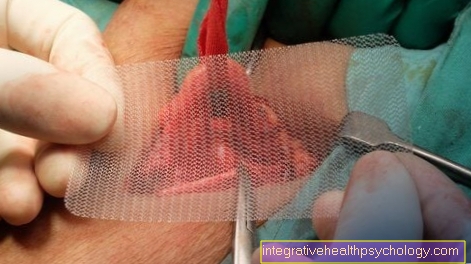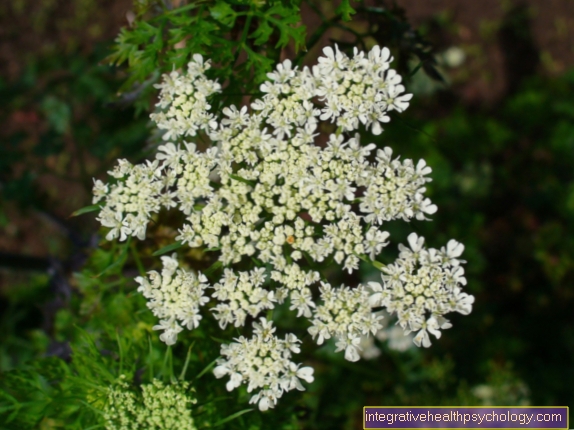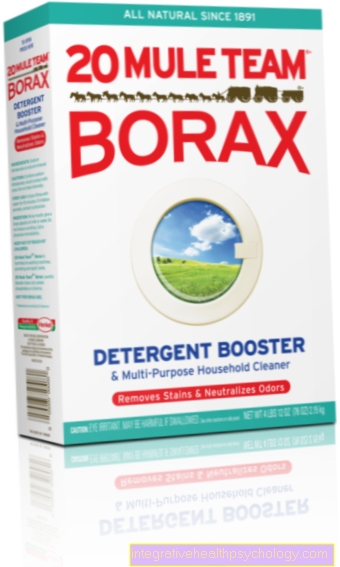incense
Definition - use of frankincense in medicine
Frankincense is known to many people primarily as a flammable resin. Even if this resin cannot be used for medicinal purposes, the extract of frankincense is used in medicine: The anti-inflammatory properties of frankincense are usually the main focus.
Frankincense was also used for disinfection in the Middle Ages. From a biochemical point of view, the substances contained in frankincense prevent the excessive production of inflammatory substances, which makes it very suitable as a herbal medicine for inflammatory or autoimmune diseases.
Other types of substances contained, in turn, inhibit the excessive growth of vascular cells, as is often found in tumor types. The use of frankincense extracts in cancer therapy is therefore being discussed.
Nevertheless, it should be noted that the extracts are not necessarily well absorbed by the body or have to be very high in doses in order to achieve a biochemical effect and that correspondingly very high doses of preparations are not permitted in Germany.
You may also be interested in the following article: Autoimmune Diseases - What is it?

Indications for the use of incense
Since frankincense is used for medicinal purposes primarily because of its antibacterial and anti-inflammatory properties, there are numerous indications for the use of frankincense preparations in this field.
So a bacterial infection, for example of the respiratory tract, can be treated supportively with frankincense.
Infections on the skin can also be treated with frankincense extract.
Another area of application is inflammatory diseases or symptoms, for example rheumatism, arthritis, chronic inflammatory bowel diseases, psoriasis (psoriasis) or neurodermatitis. Depending on the localization, the drug can be brought closer to the inflammation by adapting the application form to the symptoms.
In principle, herbal medicinal products with frankincense are a way of supporting prescribed medication or of treating minor infections or inflammations independently. Frankincense extracts are by no means a substitute for medication prescribed by a doctor and should therefore be viewed as an addition to solid medication.
Effects of incense
Frankincense is traditionally thought to have anti-inflammatory and slightly disinfectant properties, which is why it is so often used in alternative medicine for many types and forms of inflammation.
This effect can be attributed biochemically to the boswellic acids contained in frankincense. Some types of this substance inhibit the production of inflammatory substances in the body by blocking an enzyme that is necessary for this. This blockage is reversible, so the enzyme is released again after a while and can then continue with its task.
Other boswellic acids develop their effect by inhibiting enzymes that are involved in the formation of new blood vessels. This process is important for many types of tumors, so it is under discussion whether regular use of frankincense extract could have a positive impact on the development of certain cancers.
At this point, however, it should be mentioned that the ingestion of herbal frankincense extracts usually did not show any concentrations of these active ingredients in the blood that would be high enough for the effects described. In order to achieve a pharmacological and scientifically proven effect from frankincense extract, the concentration of the boswellic acids contained would have to be artificially increased. Such highly concentrated preparations are only available with a doctor's prescription.
What other measures are available to inhibit inflammation? The following article could also be of importance to you: What anti-inflammatory drugs are there?
Uses of incense
Incense capsules
To use frankincense orally, the medically relevant substances can be taken in the form of capsules. It is therefore not a question of capsules that contain pure frankincense resin, but rather an extract from the substances that are supposed to have an effect on the body.
The advantage of this application form is - similar to the tablets - the uncomplicated absorption of the frankincense extracts directly into the body. However, oral absorption or absorption via the gastrointestinal tract is difficult for the substances in frankincense extracts, which is why these preparations would have to be very high in doses in order to have an effect on the blood level of the extracts.
Incense tablets
Frankincense extract is also often available in tablet form. The medically relevant substances of frankincense are then mixed with a binding agent and pressed into tablet form. As with the capsules, the extracts can be absorbed directly into the body, but here, too, attention should be paid to a high dosage, since the body naturally absorbs the substances responsible for the effect of frankincense poorly via the gastrointestinal tract.
Frankincense oil
An essential oil can also be made from frankincense, which has the healing properties that are attributed to the basic substance frankincense. Such frankincense oil can be used externally as well as internally to help inflammation in the body to heal. This makes frankincense oil a very versatile application.
As an external application, the oil can be rubbed or massaged into inflamed or swollen areas of the body and skin to provide relief.
A few drops of frankincense oil can also be used as a bath additive.
Internal use of frankincense oil can take place, for example, by inhalation: For this, hot, steaming water is mixed with a little frankincense oil (about one to two drops per liter, depending on the severity of the symptoms). The affected person then inhales the vapor of this aqueous mixture.
In the case of frankincense oil, attention should definitely be paid to the intended area of application, especially with inhalation, incorrect use can otherwise cause severe irritation of the skin and mucous membranes.
In addition to frankincense oil, other oils are also recommended. You can find some of these oils summarized at:
- castor oil
- Tea tree oil
Incense ointment
With a frankincense ointment, the anti-inflammatory properties attributed to frankincense can be brought directly to the inflamed areas of the skin or body. An application is therefore conceivable for neurodermatitis or psoriasis, for example. Frankincense ointment can also prevent inflammation in wounds.
Since the ointment is supposed to act on the underlying body structures after it has been absorbed into the skin, it is also used in the treatment of inflammatory joint and bone diseases. This can be osteoarthritis, arthritis or chronic rheumatic complaints, for example.
When using it, it should be ensured that solid tissue structures, such as the joints, are spared when massaging. However, the frankincense ointment does not replace any medication that was prescribed for such complaints.
Some diseases are listed in the text section. Are you affected by any of these and are you looking for the best treatment? You can also read the respective main pages relating to these topics:
- Treatment of psoriasis
- Can you cure neurodermatitis?
- This is how you should proceed with osteoarthritis
side effect
In the case of preparations containing herbal frankincense extracts in moderate concentrations, the expected side effects are very low or their occurrence is very unlikely.
In rare cases, there may be an allergic reaction to frankincense. These can appear differently depending on the application of the frankincense preparation: when used externally, they usually manifest themselves with itching; Gastrointestinal complaints such as diarrhea, bloating or nausea are - albeit rare - typical side effects when used internally.
When should frankincense not be used?
As a low-dose, herbal medicinal product, frankincense has no significant interactions with other drugs and no contraindications. However, it is advisable to consult your doctor before taking it if you are pregnant or breastfeeding.
As the boswellic acids contained and responsible for the effect of frankincense, as already mentioned, cannot be easily absorbed via the gastrointestinal tract and the preparations available in Germany therefore do not have any noteworthy, chemically detectable blood levels of these substances Consumption of incense is generally harmless.
Dosage of incense
The dosage of preparations containing frankincense depends largely on the type and severity of the symptoms. The form of application also plays a major role in the dosage.
As a rule of thumb you can remember: three times a day to start with, one or two tablets or capsules should be taken at regular intervals.
In the case of tablets or capsules with a higher dose of over one gram, initially only one tablet or capsule should be taken per day.
If frankincense oil or ointment is used for massaging, this should be done a maximum of once a day in order not to overload the tissue.
Inhalation with frankincense oil and hot water should initially be carried out once a day and if necessary or severe discomfort can then be increased to two to three times a day.
Price of incense
First of all, the price of frankincense preparations depends on the concentration that is contained in the medicine. Preparations with moderate concentrations are usually available for between 10 and 20 euros for 100 capsules.
In contrast, higher concentrations that can ensure a biochemically and pharmacologically detectable level of medically relevant boswellic acids are not permitted in Germany.
For ointments and creams with frankincense extract, you can also expect between 10 and 20 euros for 100 mL.
Alternatives to incense
Instead of frankincense, other home remedies or herbal supplements can be used.
To treat inflammatory autoimmune skin diseases, for example, ointments with urea or evening primrose oil are available.
Essential oils, which have a cooling effect and thus relieve itching, can also help: These include camphor and menthol.
To relieve inflammatory joint problems such as arthritis or rheumatism, in addition to frankincense preparations, ointments with arnica or wallwort are also recommended. Both have a calming effect on inflamed joints.
As an alternative to frankincense in the supportive treatment of inflammatory bowel diseases such as Crohn's disease or ulcerative colitis, treatment with acupuncture can be tried in addition to a stress-free lifestyle and a healthy, balanced diet.
Aloe vera juice, taken daily, can also help relieve inflammation in the intestines.
In addition to the linked medicinal plants in the text, you can read an overview of all the important medicinal plants again: Which medicinal plants are recommended?
Consumption of frankincense during pregnancy and breastfeeding
If you are pregnant or breastfeeding, you should consult your gynecologist or your accompanying midwife before taking any frankincense preparations.
In most cases, it is ultimately possible to take frankincense extract, because nothing is known of the active ingredients being transferred to the placenta or breast milk, or even harm to the child as a result. Nevertheless, this decision and the dosage should be tailored to the individual case.
Effectiveness of the pill when taking frankincense
The effect of the birth control pill can be impaired if certain herbal substances are taken. However, this is not the case with most frankincense preparations. Frankincense extract and the birth control pill can therefore normally be taken at the same time without hesitation.
If it is a high-dose incense preparation prescribed by prescription, the attending physician can be consulted for safety before taking it.
You can also read at this point: Which drugs affect the way the pill works?





























